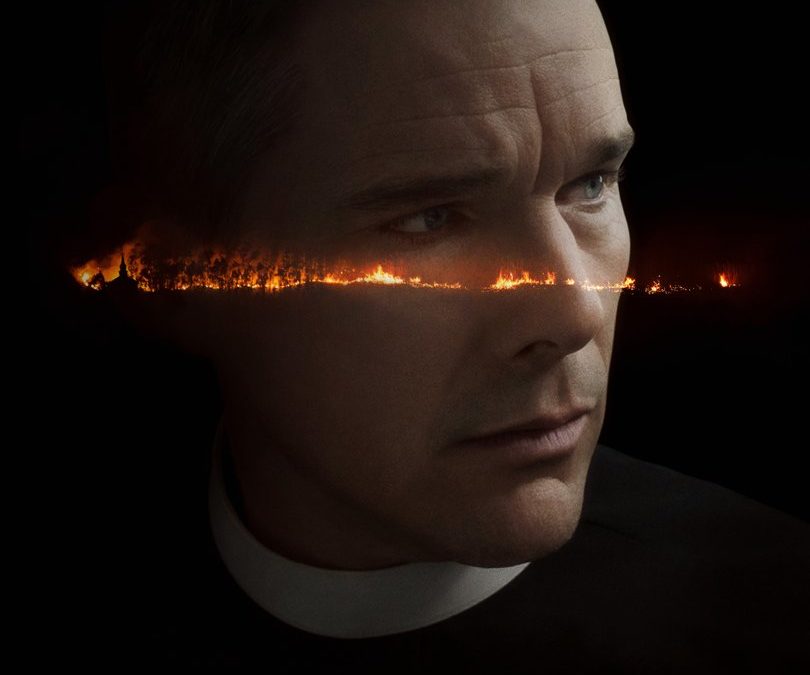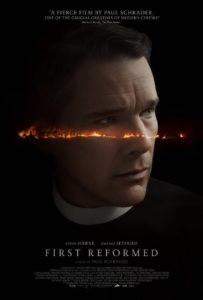First Reformed


First Reformed
Release Date: May 18, 2018
Runtime: 108 minutes
Rating: R
Studio: A24
Director: Paul Schrader
Cast: Ethan Hawke; Amanda Seyfried; Cedric Antonio Kyles; Philip Ettinger; Victoria Hill; Michael Gaston
“Will God Forgive Us?” That seems to be the dominant theme that runs throughout “First Reformed,” the provocative new film from writer-director, Paul Schrader. Echoing the sentiments of many of Schrader’s previous films both as writer (most obviously, “Taxi Driver,” of which “First Reformed” shares clear parallels) and director (“American Gigolo,” “Auto Focus”), as well as drawing clear inspiration from Bergman’s 1963 masterpiece of melancholia, “Winter Light,” “First Reformed” addresses questions of man’s purpose, despair, faith, and, ultimately, hope.
Reverend Toller (Ethan Hawke) slogs his way through the day-to-day duties of his small (but historic) upstate New York parish. Content, but not exactly happy, Toller harbors corrosive demons (as one naturally might) stemming from the death of his son in Iraq and the subsequent dissolution of a marriage that couldn’t weather the tragedy. Toller tries in his capacity as reverend to tend to matters relating to his church (the organ is in desperate need of repair, for example) and to offer guidance to a troubled young couple, Mary and Michael (Amanda Seyfried and Phillip Ettinger).
Michael, a post-traumatic doomsday theorist, is having a particularly hard time adjusting after a stint in jail. Mary is pregnant and Michael seems to think it rather, well, unfair to bring a child into a world he views as cultivating its own destruction. Michael serves as the catalyst that prompts Toller to ruminate on man’s place in the cosmos. Imparted via an especially effective use of voice-over, Toller pontificates about what he perceives as man’s betrayal of God’s plan. Using Toller and his developing relationship with Mary (the film’s religious undertones leave no question that the character name of Mary is intentional), “First Reformed” posits existential questions that even the film acknowledges to be unanswerable, at least through traditional rational thought. Is there any purpose in trying to correct man’s wrongdoings in the world? (This question is made explicitly relevant with an almost secondary storyline relating to climate change.) How does one balance hope and despair? Is it even possible to be saved? Toller’s general ambivalence may help to explain the reluctance he has to seek treatment for what is clearly a serious medical issue, not to mention his cruel rejection of his colleague (and former lover), Esther (Victoria Hill), the choir director of the larger parent congregation.
The themes at play and the questions the film raises are a lot for any movie to stuff into 108 minutes. Luckily, we have Paul Schrader at the helm. A seasoned storyteller, Schrader manages to streamline all of the ideas in “First Reformed” and creates an intriguing drama with the moral fallibility of Toller as the connecting tissue. I’ve never been the greatest Ethan Hawke fan but he delivers a particularly impressive performance as Toller, powerfully conveying both Toller’s mental fragility and sense of obligation to his faith. I wish Hawke would assume more roles like this; he’s very good when he is allowed the opportunity to burrow into the psyche and the soul of a deeply conflicted character. Amanda Seyfried is almost too good of an actress to play Mary as presented here, but she handles Mary’s own crisis of conscience well (Everyone in this movie seems to have a crisis of conscience. I don’t mean for that to come across as glib since I believe this to be a deliberate narrative choice by Schrader.).
The writer-director provides all of the main characters (Hawke, Seyfried, Ettinger) with some beautiful and meaningful monologues that allow the actors to immerse themselves fully into their characters and find their truths. Co-star Cedric the Entertainer (billed under his birth name, Cedric Antonio Kyles) is a pleasure to watch in a welcome change of pace, flexing some dramatic chops. Special mention should be given to cinematographer Alexander Dynan, who shoots the film in a washed-out tone that perfectly suits the bleak upstate setting.
However, the shining star here is Schrader’s dense and absorbing script. This movie gets deep so be wary of seeing it if you are more inclined to prefer movies like “The Avengers” or “Life of the Party,” both of which are currently in general release. The stark atmosphere that surrounds these wounded souls perfectly encapsulates their tender states-of-mind, but as Schrader espouses early in the film, despair and hope can coexist. He poses to us, the audience, to make a decision on which way the scales will tip.

1 Comment
A very in depth review. A clear sense of what it’s all about.